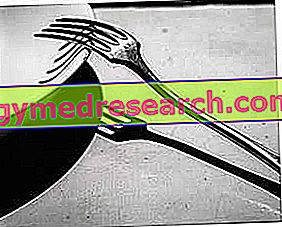Related articles: Functional Meteorism
Definition
Meteorism is an accumulation of gas in the stomach and intestines, due to fermentative phenomena in the digestive tract or secondary to functional and organic disorders. It manifests itself with swelling and increased abdominal tension, singly or in association with other gastrointestinal symptoms.
Functional disorders that can lead to meteorism include: aerophagia, non-ulcerative dyspepsia, gastroparesis and irritable bowel syndrome.
Ingestion of large amounts of air (aerophagia) and diffusion from the blood to the intestinal lumen contribute to the production of intestinal gases. Aerofagia, in particular, is eliminated with eructations, but can cause a sense of postprandial fullness and abdominal tension.
The excessive production of gas in the digestive tract is influenced by the ingestion of foods rich in fiber (such as beans, whole grains etc.), the consumption of carbonated beverages and the speed of gastrointestinal transit (if slow, meteorism is more likely) . Also the intake of poorly tolerated nutrients can induce this consequence. Meteorism, for example, is one of the typical symptoms of lactose intolerance: in conjunction with the intake of milk and derivatives, abdominal swelling and distension, diarrhea, flatulence and abdominal cramps are manifested.
Another cause of meteorism is intestinal dysbiosis, a possible consequence of infections, intake of antibiotics and other drugs, stress conditions and eating disorders. Meteorism can also be caused by ulcerative colitis, chronic constipation, anorexia nervosa and bulimia. Furthermore, this symptom can occur in the context of organic diseases, including colon cancer and ovarian cancer.

Meteorism causes abdominal distension and accumulation of gas, which sometimes manifests itself with obvious moans
Possible Causes * of Functional Meteorism
- Food Allergy
- Nervous anorexia
- Anxiety
- Appendicitis
- Bulimia
- Colon cancer
- Celiac disease
- Liver Cirrhosis
- Renal colic
- Colitis
- Spastic colitis
- Ulcerative colitis
- Uncontrolled feeding disorder
- Meckel's diverticulum
- Enteritis
- Cystic fibrosis
- Gastroenteritis
- Viral gastroenteritis
- Giardiasis
- Intestinal Infarction
- Heart failure
- Kidney failure
- Lactose intolerance
- Food intolerance
- Hirschsprung disease
- Bowel obstruction
- Peritonitis
- Irritable bowel syndrome
- Feto-alcohol syndrome
- Constipation
- Ovarian cancer



